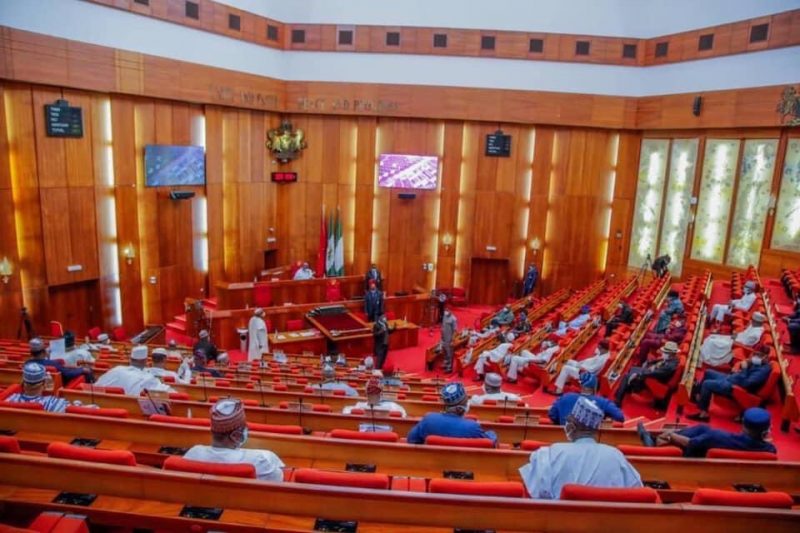
Nigerian federal lawmakers resumed legislative activities for 2022 at the National Assembly on Tuesday.
The lawmakers had embarked on a four-week break on December 22, 2021, to observe the Christmas and new year holidays. The break was sequel to the passage of the 2022 budget and the Finance Bill. It also followed the rejection of the Electoral Amendment Bill by President Muhammadu Buhari, an act which had brewed tension among lawmakers – many of whom were willing to override the president’s decision.
In 2021, the lawmakers treated key legislations like the passage of the Petroleum Industry Bill and the Electoral Bill, among others.
The new year brings closer the end of the ninth assembly and as lawmakers resumed legislative activities on Tuesday, here are a few things to expect:
-
Contents
2022 Budget (Amendment)
Although the 2022 budget was signed by the president on December 31, there will be some amendments to it, at least so the president has said.
The N17.01 trillion budget for the 2022 fiscal year was passed by the lawmakers shortly before closing for the year and was signed days later by Mr Buhari. The president had queried the lawmakers for inserting 6,576 new projects worth about N37 billion in the budget.
He also complained that they slashed the allocations for many strategic capital projects to introduce ‘Empowerment Projects’.
Mr Buhari, however, noted that he had reluctantly signed the budget to enable implementation to start from January and would revert to the National Assembly with a request for amendment and/or virement when the lawmakers resume from their current recess.
The Senate is expected to prioritise these amendments to the budget to enable early implementation.
-
Electoral Amendment Bill
Months after it was passed by the National Assembly and rejected by the president, this legislation still remains the talk of the town for many Nigerians especially as the 2023 general elections draw near.
The bill seeks to resolve issues regarding the use of modern technologies in the electoral process and prescribe a particular mode of primary election for political parties to choose candidates seeking elective offices.
In the bill, the National Assembly allowed the use of electronic voting and transmission of results from polling units, at the discretion of the electoral umpire, INEC. They also approved that direct primaries be the only mode of primary election for political parties – a clause the president was not comfortable with and the reason he cited for declining assent to the bill.
PREMIUM TIMES reported how over 73 lawmakers had agreed to override the president’s decision but by the following day, the Senate President, Ahmad Lawan, said they would “consult” with their counterparts at the House of Representatives before making a final decision.
With the legislation now back at the National Assembly, Nigerians hope the lawmakers will either make the necessary changes to the bill and send it back to the president for assent or override his veto.
-
Constitution Review
The amendment of the 1999 Constitution is underway. It would be the fifth alteration to the main Nigerian law.
The process which has been on for over a year, has attracted criticisms and commendations from Nigerians.
About N1 billion has been allocated to the constitution review committee for the whole process. And public hearings were held for this purpose – of which many recommendations were made by stakeholders.
Some of the recommendations include calls for restructuring, gender equality, state police, an entirely new constitution, among others.
Nigerians await the report of the Constitution Review committee and it is expected that amending the constitution will be a top priority for the lawmakers in 2022.
-
Gender and Equal Opportunities Bill
This bill has suffered setbacks at the Senate thrice.
The legislation seeks to guarantee the rights of women to equal opportunities in employment, equal rights to inheritance for both male and female children; equal rights for women in marriage and divorce, equal access to education, property/land ownership and inheritance.
Some male lawmakers first rejected it, arguing that the Nigerian Constitution was clear on the rights of citizens, including women.
The second time it was presented at the Senate, it scaled second reading and was referred to the Senate committee on Judiciary, Human Rights and Legal Matters but no public hearing was held. It was reintroduced in November 2019.
However, at the second reading in December 2021, some male lawmakers argued that “equality” as prescribed in the bill goes against the morals and socio-cultural practice of Islam.
The sponsor of the bill, Biodun Olujimi, was forced to step down the bill for further legislative work.
Debate on the bill is expected to continue in 2022.
-
Possible defections
As is common during the pre-election period, many political players – including lawmakers – defected from one party to another, giving several reasons for doing so.
In 2021 some senators defected to the ruling All Progressives Congress. Some of these lawmakers are Delta senator Peter Nwabaoshi, all Zamfara senators; Adamawa senator Elisha Abbo and Anambra senator Stella Oduah.
In the build up of the 2023 general elections and party crisis in both the APC and the opposition party, PDP, more defections are expected.


















































